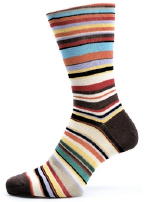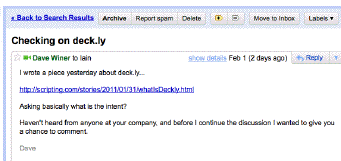
 Following-up on deck.ly
Following-up on deck.ly 
Earlier this week I wrote a brief piece about the questions raised by Tweetdeck's new deck.ly service, but didn't hear from anyone at the company re the intent of the product.
So I sent an email to Iain Dodsworth, the creator of the product and CEO of the company asking for follow-up, two days ago. Dodsworth and I had communicated in the past about the product and approaches to connecting it with other elements of the "twittersphere" via RSS.
It's a very important offering, and it's important to know what, exactly, it is -- and how open it is to Tweetdeck's competitors. Those that exist now, and those that might exist in the future. Users should want to know how accessible their ideas are outside of Tweetdeck's silo. Can it participate in an ecosystem, or is it forever locked-in? Or something inbetween?
Please, people at Tweetdeck, can we begin an open exploration of your product?
Thanks...
 No feeds on The Daily
No feeds on The Daily 
I asked a PR person for The Daily, announced yesterday, if they had feeds. I got back a definitive answer: No.
Here's a screen shot of the email.
However, re-reading the answer I'm concerned she misunderstood the question. If they do actually have feeds I can plug into my aggregator, perhaps someone from their organization will post a comment. Thanks!
 Should we trust Bill Keller?
Should we trust Bill Keller? 
In the decade-long debate about the future of news and blogging, the defenders of professional journalism always fall back on long-term investigative work for justification. The argument goes as follows. Blogging may be the domain of primary sources and the individuals they used to quote in everyday pieces now have their own blogs. But investigative journalism, working the sources, that's expensive. You need pros to do that work.
 This always struck me as naive. The forward march of technology rarely leaves structures intact. Our economy has a completely different shape after the Internet.
This always struck me as naive. The forward march of technology rarely leaves structures intact. Our economy has a completely different shape after the Internet.
And then along comes WikiLeaks to prove that even investigative journalism works differently with the advent of the Internet. But that's okay, because finally -- the mainstream guys, instead of fighting Internet-inspired change, see the opportunity and are embracing it! The Times, Guardian, Spiegel et al, have been working with WikiLeaks to establish a publishing workflow that protects sources and gets readers the information we need. Before judging the Times as wholly ineffective and dishonest, let's acknowledge that someone down there is doing their job. They may not like Julian Assange, but that's life. We all have to do things we don't like. Or you could just sit it out.
The Times has said that they may operate their own leaks site, but for now that seems as pointless as Assange saying he's going to replace the pros with volunteers. That was his first approach. It would have been mine too, because I have a basic distrust of the big pubs. And the Keller-led smear job of Assange is providing a good reminder of why it's correct to distrust them.
But the smear job is not going to work, because the issue is not Julian Assange. I've been on the receiving end of this kind of smear campaign, and it's not pleasant. But once there's more than one way for leaks to flow over the net, and that day is already here, you're just playing whac-a-mole by pretending you can make it personal and win. It ain't personal.
 All along I've been saying to the pros that what I want to do is work with you, not against you. If you listen carefully Assange is saying the same thing. I know it's tough to find in mid-late middle age, after having climbed to the top of the ladder in your profession, that the ladder is tottering and it looks like it's going away. But if you want your organizations to continue, you're going to have to stop fighting change and start going with the flow. We are going to get more visibility into the way the government and economy work. The people who are scared of us seeing what we will see need to change their ways. Now.
All along I've been saying to the pros that what I want to do is work with you, not against you. If you listen carefully Assange is saying the same thing. I know it's tough to find in mid-late middle age, after having climbed to the top of the ladder in your profession, that the ladder is tottering and it looks like it's going away. But if you want your organizations to continue, you're going to have to stop fighting change and start going with the flow. We are going to get more visibility into the way the government and economy work. The people who are scared of us seeing what we will see need to change their ways. Now.
In a way, if we care about being informed, there's not a whole lot of difference between Mubarek in Egypt and the mainstream press in the US. They're all part of an old comfortable system that has left most people out and on the sidelines. What we're saying now is that we are involved, and we want to know what's going on, in specifics. No more bedtime stories like the one with the ogre Julian Assange and the white knight Bill Keller. When we have to make decisions we don't want the distractions of personal smears, rather we want to know where the money is going and who's getting fucked to make our government and oligarchs richer and look good.
One more thing. We must also have visibility into the news organizations if we're going to trust them, the same way we have visibility into the government. Certainly someone in the Times organization knew that Judith Miller was tight with Scooter Libby before the story broke publicly? Where is the dropbox that Times insiders can leave anonymous clues for those outside their organization who would like to know what they are not disclosing voluntarily.
PS: Expect a movie about Assange's socks, based on Keller's smear in the NYT Magazine.




